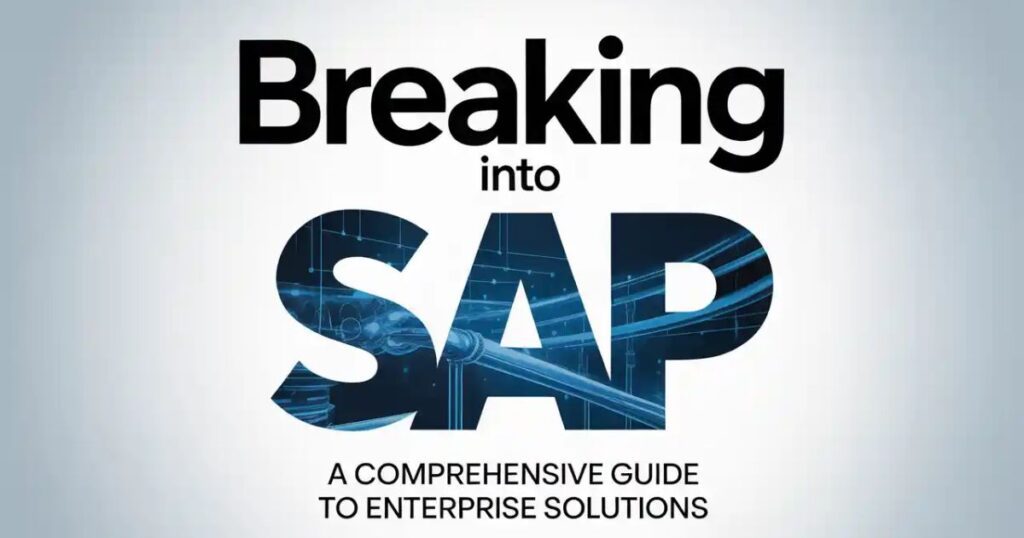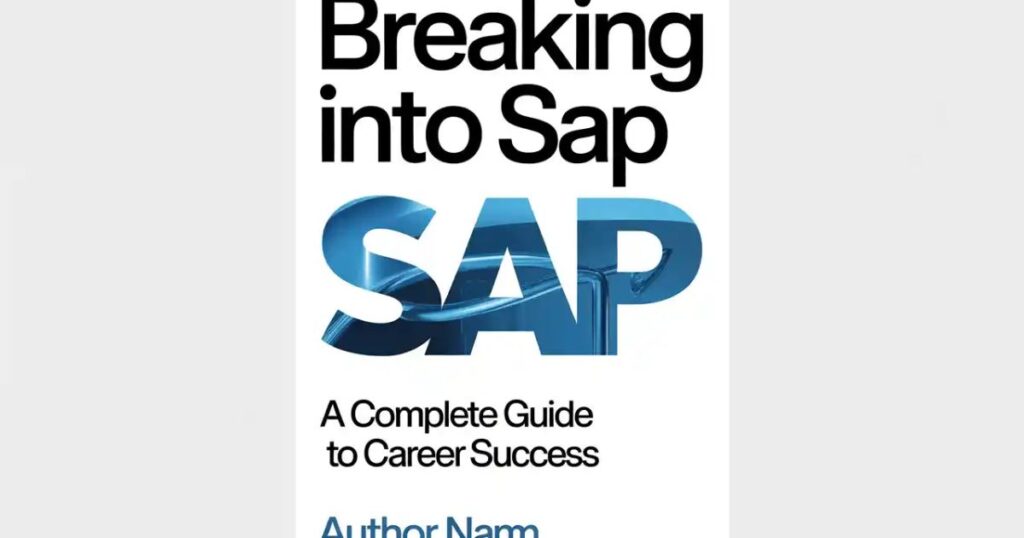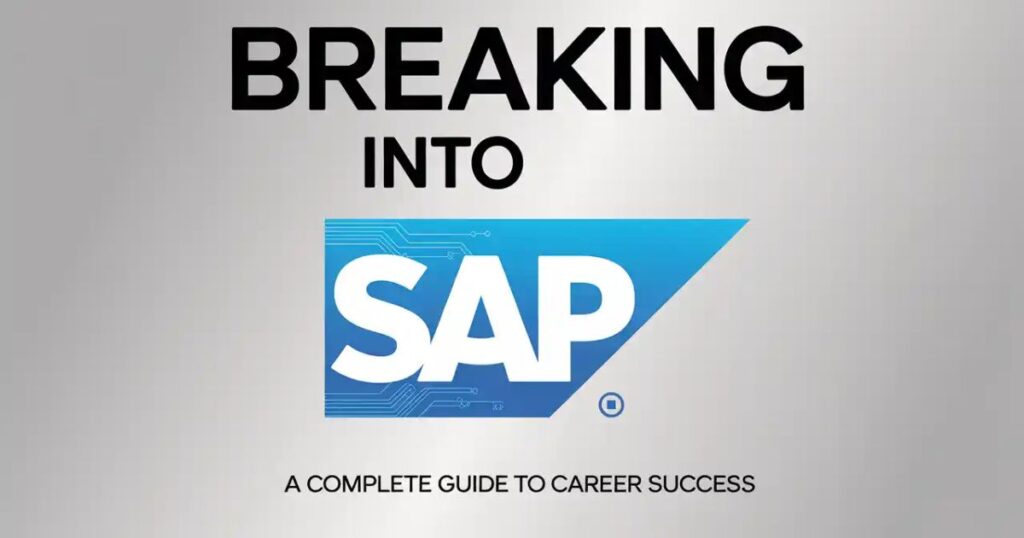Enterprise Resource Planning (ERP) systems, such as Breaking Into SAP, are more than simply software in today’s labor market; they are entry points to solid, well-paying technology jobs, particularly in the USA, South Asia, and many developing nations. There’s a catch, though: SAP expertise is seen as premium, and training is either costly or unavailable.

For this reason, CheckMateITTech’s low-cost SAP curriculum is intriguing. By lowering the entry hurdle, it will provide an opportunity for those who might not have had access to large funds, connections, or typical corporate training in the Swiss way to get practical SAP skills. Many see this program as their path to becoming a BDC Associate or specializing in certain SAP modules like SAP APO (Advanced Planning and Optimization), rather than just a training.
What is CheckMateITTech’s SAP Program?
First, a synopsis of CheckMateITTech’s offerings based on what is known by the general public:
- They offer SAP training in a number of modules, including ERP, IS-Telecom, Hybris, ABAP & HANA, and more.
- Hands-on projects, bundled courses, and a lot of course hours are typical components of their instruction. For instance, their SAP ABAP HANA Training is said to consist of “400 hours, 30+ projects, and 10+ courses.
- Some reviews give the training good ratings (4.9/5 for a number of courses), indicating that students find the instruction and content valuable.
It’s not always obvious what makes CheckMateITTech “cheap” or reasonably priced, but when compared to other SAP training programs (particularly those that are officially approved by SAP or major consultancies), it appears to provide something in the mid- to lower-budget to lower-cost range with respectable depth.
Who is This Good For?
If you are considering this program, here are some personas for whom it makes sense:
- Fresh graduates / early-career professionals who want to enter the ERP / SAP domain but don’t have four‑year experience or a large budget for training.
- Professionals in adjacent fields (IT support, junior developers, business analysts, supply chain assistants, etc.) who want to up‑skill toward SAP.
- People targeting roles like BDC Associate / SAP APO Specialist, because the modules taught could align with what is needed in those roles.
- Budget‑conscious learners who are willing to put in extra work self‑study, extra practice, because the course gives you structure, but some of the “premium” extras (like expensive labs, certifications, live mentoring) might be limited.
What is a BDC Associate, and How Does SAP Training Help?
“BDC Associate” is short for Business Data Cloud Associate (though in different organizations acronyms and titles vary). Based on job posts, this kind of role often involves:
- Data warehousing and data replication.
- Working with SAP products/tools like SAP BDC, SAP HANA, SAP Datasphere, SAP Analytics Cloud.
- Building dashboards, visual reports.
- Helping in the early stages of SAP implementations or analytics less about deep customizing, more about data, understanding business metrics, ensuring data flows correctly.

To be credible for such roles, you need a mix of skills:
- Some technical comfort (SQL, understanding data models, sometimes basics of coding or scripting).
- Understanding of business process flows (e.g. how procurement, supply, manufacturing, finance work).
- Exposure to SAP modules or tools; even if your expertise is basic, having done hands‑on work or labs is a plus.
- If you have SAP APO background (or supply chain modules), that adds another layer of value, especially for roles in operations or supply chain analytics.
SAP APO Training: Why It Matters
Advanced Planning & Optimization, or SAP APO, is a SAP module (or collection of modules) for supply chain planning that includes master data pertinent to planning as well as demand planning (DP), supply network planning (SNP), and interfaces (CIF). Businesses with intricate supply chains that wish to improve production schedules, inventory, forecasting, and distribution frequently employ it.
Knowledge of SAP APO is useful for the following reasons:
- Although SAP has been promoting IBP, or integrated business planning, as a more contemporary option, many businesses still utilize APO. Therefore, there is still a need for APO capabilities, particularly in companies where migration hasn’t happened yet.
- Gaining a deeper understanding of APO allows you to better understand supply chain planning process flows, master data, demand forecasting, and planning parameters. Even if you eventually go to IBP or other tools, that will still be helpful.
- APO modules are directly pertinent if your job entails network planning, demand forecasting, or inventory optimization.
But it’s also critical to remember:
- Many new SAP clients are increasingly switching from APO to IBP. If you receive APO training, you should also focus on IBP, or make sure your training includes the most recent versions and transitions.
- It is essential to have practical experience with APO, including setting up CIF and navigating SNP/DP issues. Reading books alone won’t prepare you for a profession.
How CheckMateITTech’s Cheap SAP Program Fits into Becoming a BDC Associate / APO Specialist
Given the points above, here’s how their program could help you, and what to watch for / expect.
What You Get / Strengths
- Coverage of multiple relevant modules: ABAP & HANA, SAP ERP, etc., so you’re not locked into one narrow path. If the APO or SAP supply chain module option is available (or added later), that’s great.
- Hands‑on projects: If they include supply chain cases, forecasting, master data, etc., that directly helps in APO‑style work. Even in ABAP or HANA, understanding how data flows, performance matters etc., helps in looming roles like BDC Associate.
- Volume of instruction hours: The more time you invest in structured learning, the better. 400 hours of training (for ABAP HANA, etc.) suggests there is depth.
What You Need to Supplement / Check
- Availability of APO‑specific training: I did not find on CheckMateITTech’s site a course explicitly titled “SAP APO Training” (as opposed to third parties like TekSlate). If their program doesn’t offer APO modules, you’ll need to get that elsewhere.
- Certification support: Many employers look for official SAP certifications or at least proof of hands‑on work. Does the cheap program help you prepare for relevant SAP certifications, especially for the modules you want (ABAP, APO, supply chain)?
- Real project environment / labs with realistic data: To simulate live situations—forecasting mismatches, supply disruptions, master data errors, etc.—so you can talk about resolving such issues in interviews.
- Curriculum up to date: Given how SAP is evolving (IBP, HANA, cloud), ensure that what you learn is not obsolete by the time you finish. If you’re learning APO, for example, ensure you understand what its future is, or how it integrates with newer tools.
- Job placement assistance: A big part of what makes “cheap but good” training worth it is how much help the provider gives with CVs, mock interviews, networking, and placements. If CheckMateITTech can help connect you to internships, small projects, or even junior‑level roles (BDC Associate or equivalent), that’s a major plus.

What to Expect in the Role of BDC Associate vs. SAP APO Specialist
To decide how to use your training time, understanding these roles helps.
| Role | Key Responsibilities | Relevant SAP / APO / Data Skills | What You Should Be Able to Demonstrate After Training |
| BDC Associate | Working with data flows, dashboards, data validation, reporting; collaborating with leads to build data models; may involve some ETL/data migration; assisting with analytics. | Basic SQL / database, understanding of SAP tools (HANA, BDC, SAC etc.), perhaps basic ABAP for custom reports; data modelling; understanding business functions. | Able to build a dashboard; import or extract data; validate data; explain business process; show a simple SAP module case you worked on. |
| SAP APO Specialist | Deep work in supply chain planning: setting up demand planning, supply planning, configuring SNP/DP, working with master data, CIF, handling forecasting/ inventory rules; sometimes performance tuning; solving supply chain challenges. | APO modules, supply‑chain theory, master data, interfaces, planning tools; maybe some version control / ABAP for custom enhancements. | Able to configure demand planning; run a forecast; handle master data issues; simulate supply scenario; explain how supply chain optimization works in APO. |
The training you undergo should ideally give you enough knowledge for both the foundational level of the BDC Associate role, and enough depth to specialize if you choose the APO path.
Potential Challenges
Cheap programs are attractive but there are risks, limitations:
- Less individualized feedback: If batches are large, you may not get one‑on‑one attention. Mistakes or misunderstandings may go uncorrected.
- Outdated course content: If many participants and trainers haven’t updated modules to include SAP IBP or cloud features, or newer SAP HANA versions.
- Certification costs: Even if training is affordable, official SAP certification exams tend to have costs (exam fees, preparation). Budget for that.
- Employment expectations: Some roles expecting “associate” level may require knowing more than just what the training covers—especially live system experience, dealing with issues, etc.
- APO’s evolving landscape: Since SAP is moving toward more cloud‑based planning (IBP) in many major organizations, sticking only with APO might limit long‑term growth unless you’re aware of migration paths and cross‑training.
Recommendations: How to Make the Most of a Cheap SAP Training Program
If you decide to enroll in CheckMateITTech’s SAP program (or something similar), here are steps to maximize its value:
- Clarify your goal early: Do you want to be a BDC Associate? Or an APO Specialist? Maybe both? Knowing this helps you choose modules/courses, ask the right questions, and focus your study.
- Ensure APO content (if you want it): If the cheap program doesn’t include APO modules (DP, SNP, CIF etc.), arrange to do complementary training (maybe online, or via free/open source materials, or via smaller specialist providers).
- Practice real‑life cases: Build small projects—forecast demand for a set of products, plan supply networks, simulate disruptions. Use open datasets or ERP sandbox environments if available.
- Focus on problem solving and business understanding: SAP is not just about configuration or coding; it’s about understanding how a business works, what the supply chain challenges are, what planning constraints exist, etc. If your training program offers case studies, discussions, make sure you engage.
- Build your portfolio: Even small projects, labs, assignments—you can showcase them on GitHub, your CV, or personal blog. If you worked on an APO demand planning configuration, show what you did, what the result was (forecast accuracy improved etc.).
- Seek certifications or endorsements: If training doesn’t include it, try to get a certificate from SAP or recognized exam bodies; or at least a completion certificate that’s credible. Also collect testimonials / samples of your work.
- Network: Talk to alumni of the program, people working in BDC associate roles, supply chain planners using SAP, APO specialists etc. LinkedIn, meetup groups, SAP forums, etc. People often share what they expect in interviews, what skills are required.
Is It Worth It?
Putting everything together: Is the cheap SAP program by CheckMateITTech worth your time and money, especially if your goal is to become a BDC Associate or SAP APO Specialist?
I’d lean toward yes, provided you are proactive, realistic, and supplement where needed. Here’s a breakdown:
- For someone who cannot afford more expensive training, this program seems to offer a strong foundation. It gets you into the SAP ecosystem, gives you hands‑on exposure, covers core modules.
- For someone aiming for BDC Associate, this program has what you need: data knowledge, SAP tool exposure, business process understanding, likely even dashboards etc. That should allow you to compete for entry‑level associate roles.
- For someone aiming for APO specialization, it might be enough if APO modules are included or can be acquired through added training. It might not give you mastery immediately, but it can be enough to get a starter role in supply chain planning and work toward higher responsibilities.
- For long term career growth, you’ll need to stay updated (IBP, cloud SAP, integration, analytics), keep refining skills, possibly re‑certify, and accumulate project experience.
Conclusion
In conclusion, CheckMateITTech’s low-cost SAP software presents a bright future for a lot of people. If you are prepared to work hard, fill in the blanks, and be strategic, it offers a thorough and reasonably priced introduction to the world of SAP.
Courses like theirs can provide you with the majority of what you need to become a BDC Associate, including knowledge of data flows, proficiency with SAP tools and dashboards, and engagement with business questions. Make sure your training covers the necessary modules (DP, SNP, CIF, master data) and that you get practical projects (not just theory) if you want to delve deeper into SAP APO.
Similar to many computer occupations, your success will be based on the skills you develop along the way, such as curiosity, perseverance, and the capacity to learn beyond what is taught. A “cheap” but good SAP curriculum can undoubtedly serve as a launching pad for a fulfilling SAP career if you are ready to put in the necessary effort.
